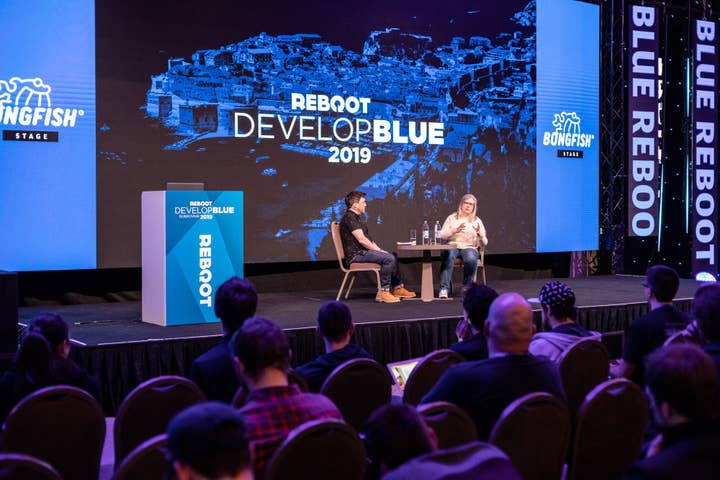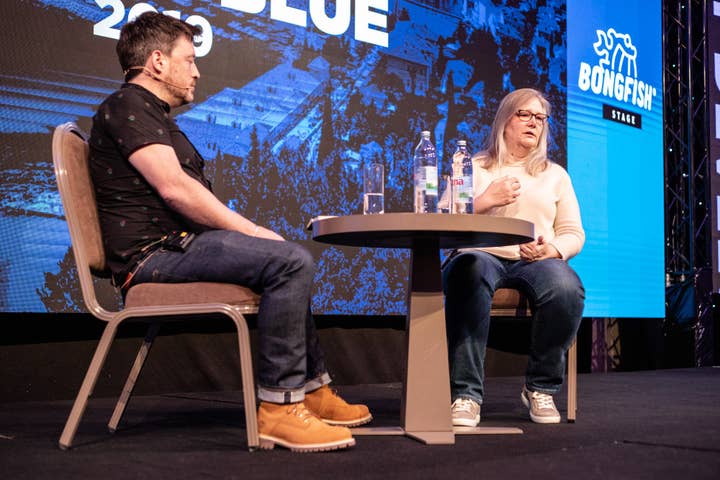Amy Hennig: Streaming must be more than "just an invisible console"
Real-time streaming will start a revolution in storytelling, Hennig said at Reboot Develop -- but new kinds of content will be required to attract a bigger audience
The hit Black Mirror special Bandersnatch points towards a forthcoming, "convergence between traditional linear media and interactive media," according to former Naughty Dog creative director Any Hennig -- but the games industry will need to recognise its own limited breadth of content to take advantage of the huge commercial opportunity it represents.
Speaking at the Reboot Develop conference earlier this month, Hennig pointed to Bandersnatch as an early example of a new wave of mass entertainment: the rise of interactivity in traditionally linear narrative forms, made possible by the spread of 5G internet technology. While Bandersnatch was ostensibly a Netflix television special, Hennig noted its use of storytelling techniques more commonly found in game development -- techniques that will only become more important as "real-time content" proliferates.
"Bandersnatch is the best model for frictionlessly easing non-gamers into interactive content"
"I love the fact that it exists, and I enjoyed the experience," Hennig said, adding that she had 'played through' Bandersnatch three times, once holding the controller and twice observing other people do the same. "This is only possible through real-time, and this is where I think the revolution comes."
Hennig deliberately used the term "real-time streaming" instead of "game streaming," which she considers "too limited" to adequately capture the impact that widespread, high-speed mobile internet will have on narrative entertainment.
"We can debate in how many years it's going to happen," she said. "Two to five? Depends on who you talk to... But not only is it going to radically change games -- it changes our business models, it changes the players in the space, it changes the kind of content we can create -- but it also changes the audience.
"And that's why I like the fact that Bandersnatch exists: it is the best model for frictionlessly easing non-gamers into interactive content."

Bandersnatch caused a sensation when it was released on Netflix at the start of this year, and the TV and film industries will have been paying close attention to its success. Indeed, Hennig implied that those industries have been aware of the potential of real-time interactive storytelling for a long time already, and the games industry is now at risk of missing out on an opportunity it has the skills and experience to make its own.
"Every studio in TV and in film has an interactive division," she said. "They're going to be on this [opportunity], and they don't actually know how to do what we do. One could argue that in story and character they have a longer track record than we have, and are more adept in some ways. But they don't understand developing content for a real-time application -- why would they? -- and they certainly don't understand interactivity. They don't have our experience."
As we explored in a pair of articles published in the aftermath of Bandersnatch, a small group of developers is already exploring this territory -- but none come close to the reach and resources of a platform like Netflix, or the myriad other huge companies that are now likely following its lead.
"We should have the humility to not go, 'Here's the games we've been making -- open wide and become a gamer'"
Hennig suggested a venn diagram composed of three sets representing areas of expertise: real-time, interactivity and story; game developers, she said, are closer to the point at which these fields intersect than anyone working in TV and film, and so have an opportunity to, "get in there and define that space for a wider audience, because if we don't do it, other people are going to."
Since the emergence of smartphone technology, the games industry has tended to see cost of entry as the only obstacle to reaching more people: the price of a console, or a gaming PC, or the $60 tag on a copy of AAA game. This thinking was evident in Google's announcement of Stadia, a real-time streaming platform that was showcased on the strength of easier access to Ubisoft's Assassin's Creed.
"I see these announcements and think, 'This is amazing. Real-time content streamed directly into our homes, into our devices, just like TV and film is now; that's mind-blowing,'" she said. "But then I see everything being justified as game streaming -- and that's just an invisible console. You're not pointing it at any bigger audience; it's just the same people that are already buying your hardware. It comes with benefits, but it just seems like very limited thinking.
"Google is talking about how it can 10x the [gaming] audience, because it can reach so many more people. But then the next beat of that conversation has to be about content; not about just having access to [a broader audience]. So we're just going to shove the content we've been making at them? If they were into those experiences, they'd already be paying for them."
In terms of the Stadia reveal, Assassin's Creed broadly represented AAA games; the content in which the industry invests the largest amounts of money. However, there are inherent barriers that prevent that kind of product from appealing to those outside of the gaming audience; Hennig mentioned complexity of controls, a reliance on player dexterity and reactions, and the use of failure to define progress. Meanwhile, indie developers have been studiously making experiences that reject, subvert and transcend those traditional values; Hennig mentioned Florence, What Remains of Edith Finch?, and Return of the Obra Dinn as examples of relatively low-budget games that, ironically, may have broader appeal than some of the industry's most visible brands.
"When I think about the potential of this new marketplace, we have to be open to the idea that we can welcome more people into our hobby," she said. "This potential wider audience, who are not being served by interactive content... This isn't about trying to convince them that they're gamers, or converting them and pulling them to where we are. I think it's incumbent on us to meet them where they are, with what we know how to do.
"Can we make content like Uncharted for an audience that wouldn't buy a PlayStation 4, or pick up that 15-plus button controller?"
"We should have the humility to not go, 'Here's the games we've been making -- open wide and become a gamer.' We really should be crafting experiences for them... We need to widen the way we think about games, to think about them as experience; and that doesn't require difficulty, competition, mastery, fail-states, setbacks."
Reboot Develop exactly coincided with the debate around difficulty and accessibility sparked by From Software's Sekiro: Shadows Die Twice. Hennig did not comment on that debate directly, but she addressed the evident mistrust held by a certain part of the gamer community, over what appealing to a wider swathe of the public will mean for the medium as a whole.
"These games should exist; games that are about competition and difficulty and mastery, even the games I've made," she said. "But that makes them inaccessible to this wider audience, and there may be some in our hobby who would go, 'Sure, that's fine' -- this whole 'git gud' thing. There is an exclusive attitude about our medium and our hobby that I don't think is healthy.
"We have to be open to the idea that we can create content that isn't about fail-states and difficulty; it's about a journey and an experience... And we're 90% of the way there [with games like Uncharted]. It's just a matter of adjusting a little bit, to go, 'Can we make content like this for an audience that wouldn't buy a PlayStation 4, or pick up that 15-plus button controller?'"
Hennig backed up her claim that the industry is already making games that are "90% of the way there" in terms of being accessible to a much larger group of people. In fact, she mentioned a "phenomenon" that is widely known and understood by creators in the games business.

"I feel like we're not giving this audience credit," Hennig said. "With games like Uncharted -- Supermassive's Until Dawn had the same effect, and I've heard stories about people getting it from Quantic Dream's Detroit: Become Human -- non-gamers in the family are just as invested in as the gamer.
"We [at Naughty Dog] heard that not just anecdotally, but consistently; a person's kid or spouse would say, 'Don't you play that game without me, I want to see what happens next.' And they didn't mean just watch it like a TV show; they were collaborating. It was an interactive experience for them.
"When I see that phenomenon, and those people being just as invested in the experience as a gamer, I look at that and go, 'Why are we not designing for that intentionally, rather than just stumbling into it? And why are we not making content for those people, rather than putting it behind the gates?'
"You're already gonna have to ease them into the idea of it, so let's not throw obstacles at them like mastery and difficulty."
While the name Sekiro was mentioned on several occasions during the onstage interview, Hennig was careful to highlight that her views are not, "a critique of what we do." Indeed, there is no greater proof of that claim than the fact she regards own games as being inaccessible to a wider audience. Hennig called for "sensitivity" towards those who perceive new and more accessible games as a threat to an essential part of their identity -- "it's just human nature" -- but in her view, nothing needs to disappear for these new forms to exist.
"I'm just looking at what we're going to have to do to reach this wider audience," she said. "There will probably be some existential concern that this will be instead of creating games [for traditional gamers]. I don't believe that -- I believe it's an 'and' rather than 'instead'.
"We dismiss the potential market and audience, and what it can do for our art form, if we just batten down the hatches and get tribal about it."
GamesIndustry.biz is a media partner of Reboot Develop. We attended the event with assistance from the organiser.

